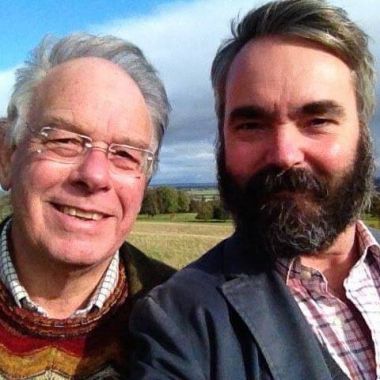Gay CofE priest says decision to ban him may encourage people to 'think again'

The Church of Engand priest banned from taking services after he married his partner last year has said he has no need to be angry, because so many people are angry on his behalf.
Canon Jeremy Davies, 69, former precentor of Salisbury cathedral who has been denied permission to officiate in the Winchester diocese, told The Guardian: "I don't need to be angry, because there are so many people feeling angry on our behalf. One of the good things is that it may encourage people to think again."
Canon Davies also said he regretted assuring his bishop when he entered a civil partnership 10 years ago that the relationship was non-sexual. He said: "The whole process seems untruthful. Why should I collude with a dishonest intrusion into a private relationship? I don't see that a sexual relationship is incompatible with a loving relationship, whether it's between people of the same gender or not. So in fact to give that assurance was, I think, colluding with the system. It shouldn't have happened."
At first he was reluctant to marry. "I resisted it. I thought a partnership is fine, but you can't have a marriage between two men or two women. Simon was all in favour of same-sex marriage, and I was against it. I had to be persuaded. I began to look again at the marriage service. And I thought the theology of marriage is not about a man and a woman."
The row erupted into the public domain after his husband and partner of 28 years, Simon McEnery, posted the decison by the Bishop of Winchester on Facebook.
McEnery, 51, a tenor, singing teacher and composer, said Bishop Tim Dakin's decision was "an affront and an insult". He added: "It says to Jeremy: your 40-plus years of ministry are worth nothing."
It was in getting married, against current church discipline, that he put himself at odds with the Church of England leadership. The Church is currently engaged in "conversations" and "listening" around the whole issue of homosexuality and will debate the results of this exercise at the General Synod meeting in York in July.
Canon Davies, who is still allowed to take services in Salisbury diocese and had a busy Christmas helping out at churches near his home, and who also does regular weddings, baptisms and funerals, said: "You don't stop being a parish priest when you retire. I hope I'll go on until I'm gaga."
Anglican archbishops and primates from the 38 provinces worldwide will meeting in the UK in January at a gathering called by the Archbishop of Canterbury Justin Welby in an attempt to avoid a split over the issue in the Anglican Communion between the conservative churches of the Global South and the more liberal churches of the West. One solution might be to reform the Communion into a Lutheran-style federation to make it easier for the provinces to continue to work together in spite of hugely-different doctrines on the subject. The US Episcopal Church is the most liberal, having appointed several openly-gay bishops, while Anglican churches in Nigeria and Uganda, where the secular state still enforces draconian penalities against homosexuals, are among the most conservative.
Clergy in the Church of England can enter same-sex civil partnerships if they plege to be celibate. They are forbidden from same-sex marriage because, like the Catholic and Orthodox churches, Orthodox Judaism and Islam, the Church of England teaches that marriage can only be heterosexual. Even if an individual priest believes differently, secular law passed by Parliament forbids him marrying a gay couple in his or her church.











